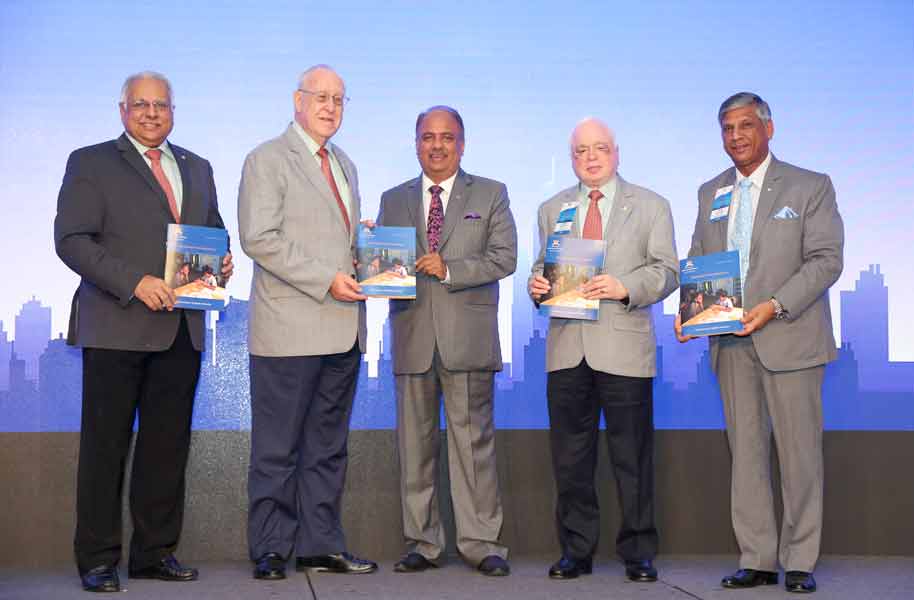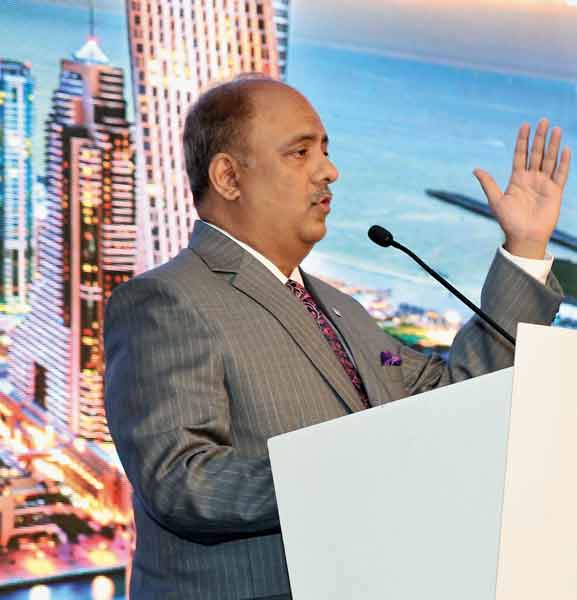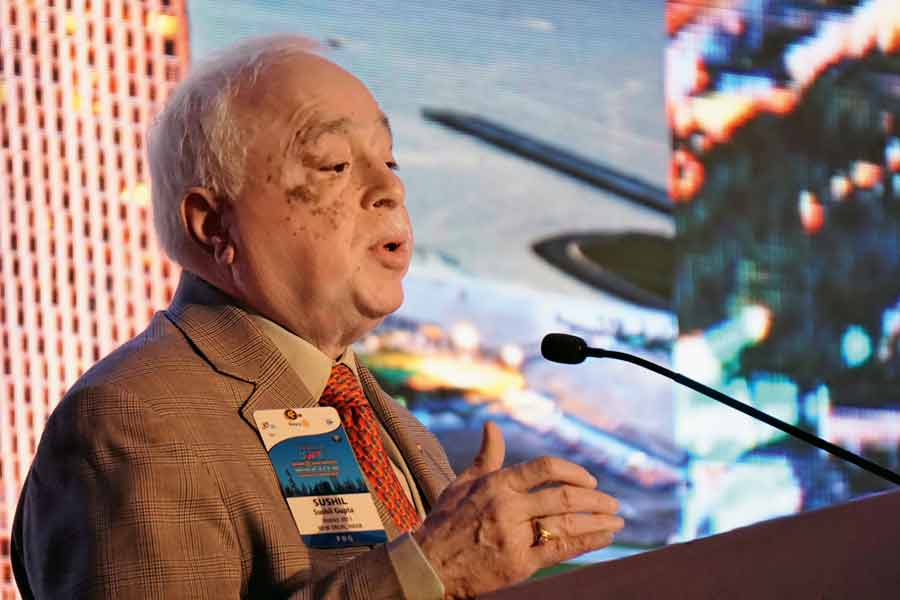
Our target was to reach 20,000 schools by the end of 2016–17, and we have the commitment of our Rotarians to do more than 23,000 schools, touching 5 million children,” said TRF Trustee and WinS Global Chair Sushil Gupta, while giving details at the Dubai Zone Institute about the project, which is one of the Rotary India flagship projects.
One of the highlights of WinS was that regular workshops and video presentations are being done in schools “and we’ve involved Interactors and Rotaractors.” He showed a video on how children sing a song, specially composed on how to wash hands, as they wash their hands.
“WinS is a game-changing programme which addresses three of the six focus areas of Rotary: water and sanitation, literacy and basic education and disease prevention.” But it was not enough for a child to just drink clean, safe water, have access to a toilet and wash her hands with soap. It had to continue for all time; “WinS aims at behaviour change for the long term, not only for the children, but also their families and the broader community,” Gupta said.
WinS is a game-changing programme which addresses three of the six focus areas of Rotary, but it is much more than building toilets.
– WinS Global Chair Sushil Gupta
He added that the programme also hopes to teach and influence adults, teachers and the community to adopt new and healthier practices for years to come. “No doubt toilets are an essential component of WASH, but the programme does not start and end with toilets. This is just one component; WASH stands for water, sanitation and hygiene and its two most important components are group hand washing and capacity building.” If hand washing and other hygienic practices were instilled in the children in schools, they would demand toilets at home, and this demand would have a trigger down effect in the entire community. “That is our objective, just by building toilets India will not become swachh or clean.”
Unique opportunity
Gupta said in India we had a unique opportunity in 130 million children getting free midday meals every day. “If you put group handwashing stations near the eating area, you are guaranteeing a 40 per cent reduction in diseases like diarrhoea, resulting in better health and attendance.”

Capacity building was also important, and hence empowered school committees had to be put in place to take ownership for the programme. Today Government schools were struggling with the retention of girls as about 40 per cent of girl students drop out at puberty because of total lack of menstrual hygiene management facilities. “You will be shocked to know that even in the best of private or public schools in India, there is no private space provided for girls for menstrual hygiene management, nor is proper education imparted to them at that tender age.”
Gupta said to finance WinS projects clubs and districts were pursuing global grants. This was an important project of TRF and there was a lot of interest worldwide for WASH. “So we are receiving support of the Rotary world and in India, there is great opportunity to get CSR funds which are to the tune of Rs 14,000 crores every year. Thanks to a Trustee decision, Rotary Foundation India can now receive CSR funds.”
Collaboration with Unicef
To take this campaign forward, Rotary is collaborating with Unicef to strengthen the Swachh Bharat Swachh Vidyalaya campaign. It was also working with the HRD Ministry, Department of Education and Rotary had been invited to participate in the Swachh Vidyalaya Puraskar. “We are also going to be a part of the National Mission for a Clean Ganga and are signing an MoU with the HRD Ministry to take up 500 schools in Bihar and Jharkhand which are abutting River Ganga. We will sensitise and educate the children to keep Ganges clean,” he added.
The Maharashtra Government wants to do 1 lakh schools with us, and this will impact 30 million children over 3–5 years.
– RILM Chair Shekhar Mehta
TEACH’s outstanding impact
Giving an overview of the Rotary India Literacy Mission’s TEACH programmes, at the session on Rotary’s future, its Chair Shekhar Mehta said it was making an “outstanding impact” thanks to the efforts of Rotarians and Inner Wheel members during the last two years. “Of the partnerships we have forged with organisations, the most outstanding one is with the Satyarthi Foundation; this gives us the biggest stamp of approval for our programme,” he said, giving an update on Literacy.
The good news is that “we have forged partnerships in each of the five verticals of TEACH”. While the support from both the Central and State Governments was great, “we have been fortunate to get huge star support from sports personalities, film stars and even politicians. The corporate world is also coming forward in a big way to support our initiatives,” he said.
Mehta disclosed that when RC Thane invited him to launch the non-braille computers to ensure that visually challenged children will no more need braille computers, the response was magical. “This project needs Rs 8 crore. PRID Ashok Mahajan was sitting in the audience and he said ‘Ok, I will get Rajashree Birla (from the Aditya Birla Foundation) to give this amount. We didn’t even ask him.”

What followed next was nothing short of “amazing! The President of the SBI India Foundation was in the audience and he said something that made my day. He said the contribution you needed has been fully subscribed to, but on behalf of SBI can I make a request? Can SBI be allowed to do 100 schools out of these 400 schools?”
Mehta showed some video clips, one being of Rani, a primary school teacher from a Maharashtra village. She loved spending time with her students, but was hampered because of several government tasks not related to teaching. Dejected, she was on the verge of quitting by taking VRS. But recently she attended a teachers’ training programme organised by a Rotary club in District 3131. She found the workshop excellent and was motivated to cancel her VRS plan. “Like her, thousands of teachers are benefitting from the RILM’s teacher training programme. RILM mission this year was to train 5,000 teachers in 2016-17, but just one District — 3131 — has ensured that the goal is shattered as the district alone is training 10,000 teachers!”
In the WinS programme, there is great opportunity to get CSR funds which are to the tune of Rs 14,000 crores every year.
– WinS Global Chair Sushil Gupta
This training includes classroom management, teaching skills, personality development, etc. District 3160 is training 3,000 teachers; “we have surpassed our goals, and will do at least 4 to 5 times the number,” Mehta said.
E-learning takes off
E-learning had now moved from the “taxying to the take-off mode. Gujarat (D 3052) has done some outstanding work; they have an MoU with the government and have put E-learning in 7,063 schools, impacting three million children.” The district has signed an MoU for 25,000 schools. Similarly Districts 3140, 3190, 3040 and 3131 have done great work in E-learning.
Mehta announced that “we are on the verge of an agreement with the SBI Foundation for 1,116 schools at a cost of Rs 5 crore, and this will impact half a million children. We were in talks with the Maharashtra Government for doing 8,510 schools. They have now upped the goal to 1 lakh schools at a cost of an unbelievable Rs 200 crores. This is going to impact 30 million children over 3–5 years. The documents have gone to the ministry for approval; they have their share of money ready and we will have to put our act together.”
While E-learning was making waves, the Adult Literacy programme was also making progress, motivating illiterate women to get basic literacy.
On Happy Schools too there was great progress; RC Jaipur Midtown had taken a great initiative to convert 10 Government schools to happy schools, impacting 15,000 children, with a contribution of Rs 52 lakh. “Equipped with benches, handwashing centres, separate toilets for girls and boys, water supply, uniforms and shoes for the children, these schools now look like private schools. The playing areas and the buildings have been painted in attractive colours, and dropout rates have fallen drastically,” he added.
On the international front, the programme was slowly maturing in Pakistan and taking shape in Bangladesh. It had a flying start in Nepal this year with the Nepal President inaugurating the National Literacy Conference, where she praised the TEACH initiative.
RILM mission this year was to train 5,000 teachers, but just one District – 3131 – has shattered the goal; this district alone is training 10,000 teachers.
– RILM Chair Shekhar Mehta
To ensure “outstanding transparency and stewardship, we have PWC as our auditors. Our three-year audited accounts are uploaded online for public view.” The annual report was released at the Institute along with a TEACH app.
In his opening remarks PRID Yash Pal Das said that though Rotary “will become more region specific, in the future, our common objective of doing good in this world will not change and for centuries Rotary will be needed to provide relief and hope, as the world continues to be challenged by natural disasters. The future of Rotary is very bright, but it is in your hands.”





